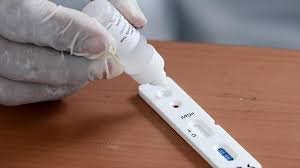Impact of sensitive and reliable kits for covid-19 testing at a scale.
January 18, 2021 | Monday | Views | By Ankit Kankar | ankit.kankar@mmactiv.com
With continued community transmission of severe acute respiratory syndrome coronavirus 2 (SARS-CoV-2) there has been a sustained focus on the role of testing to mitigate and suppress spread. While multiple parallel efforts to bring diagnostic innovation to COVID-19 testing are underway, testing in the public health setting brings different challenges.
Image Source : aa.com.tr
In May 2020, 15 of the 25 samples tested by Government Villupuram Medical College, Villupuram, Tamil Nadu, turned negative in the confirmatory test. It came hours after the lab technicians had confirmed that the screening tests were positive. Another incident in November 2020- Telugu superstar, Chiranjeevi, announced on Twitter, that he had tested positive earlier due to a faulty kit.
In the case of the Government Villupuram , experts said it could be a problem based on multiple reasons: insufficient sample, technical issues with the kits or inexperienced staff running the test. A significant aspect of SARS-CoV-2 is that it can be transmitted while a host is asymptomatic. Epidemiologic evidence has demonstrated that pre-symptomatic and asymptomatic transmission of virus has driven the current epidemic. In such setting, the best test is not necessarily one that determines whether a person has any evidence of SARS-CoV-2, but one that quickly and accurately identifies individuals who are capable of transmitting the infection to others.
The different types of testing:
Currently, there are three major types of testing.
- Rapid Antigen Testing: This looks for the presence of the SARS-CoV-2 virus in the body by testing the fragments of proteins that are found within the virus. It can be analyzed at the point-of-care in a process that can take as little as 15 minutes. However, the trade-off for the speed and convenience of an antigen COVID-19 test is its specificity and reliability
- RT-PCR tests: The RT-PCR tests are considered the gold standard for COVID-19 testing as it provides a more definitive result because of its high level of specificity and sensitivity Here samples are tested for genetic material of the virus.
- Serological Assay: For ramping of tests, apart from molecular test, quantitative measurement of immunoglobulin G (IgG) antibodies raised against the spike protein of the SARS-CoV-2 virus will provide a better understanding of a person’s immune response after being exposed to the Covid-19 virus.
The impact of false negatives and false positives
False negatives can lead to disastrous consequences. It can not only endanger the life of the person who has been deemed virus free, but also possibly set off a cascading chain of infections. In many cases, infected people are asymptomatic and hence are not isolated. They can subsequently rapidly infect others. Similarly, a false positive can erroneously lead to unnecessary quarantine and contact tracing exercises, as well as significant stress for the concerned individual and family.
Today a major point of concern for most healthcare bodies is the availability of reliable and consistent tests in the country. In October 2020, Maharashtra’s health minister, Rajesh Tope, pointed out that the state had 12.5 lakh faulty RT-PCR test kits in circulation. Purchased from a private company, the test kits were found to have a lower positivity rate. In September 2020, the Delhi High Court has also suggested to the Delhi Government to use of reliable testing strategies to control the outbreak. As the COIVID pandemic required companies to manufacture and scale their capacities, approvals were fast-tracked to enable a quick response. These incidents clearly highlight the need for a strict follow-up on the quality and reliability of the test-kits
Importance of review assessment for test accuracy and clinical researchers
Given the varied experience of healthcare staff handling samples, it is critical to establish standard guidelines. First, tests must be sensitive and validated under realistic conditions. Regulators must also ensure that manufacturers must provide details of the clinical sensitivity of the tests and the specificity at the time of market authorization. For people who have tested negative, it is important to again test the probability of infection using another method that will either confirm or deny the result. Test kits must hence be subject to rigorous quality checks and must be ISO certified. It is also important to leverage emerging techniques such as mass spectrometry that can detect the presence of the SARS-CoV-2 virus accurately.
Features to look for in reliable test kits
Some of the key capabilities and features that should be looked for from manufacturers of reliable test kits include:
- Must be highly sensitive to detect the SARS-CoV-2 virus
- Ability to detect the presence of the virus at very low levels when used by a qualified lab according the strict requirements of the most current regulatory approvals
- Must have the capability to produce more than huge number of tests per week to meet the rising demand
- The test kits must be updated with the new techniques, depending on market and research developments
- Must include detailed instructions for use, with continuous and ongoing software support for updates.
- Large distribution to enable faster deliveries and training support to handle samples and operate instruments.
Testing as part of a coordinated strategy
Even as efforts continue to address public health testing challenges, health systems and government must place a greater emphasis on quality tests than procuring test kits because they are low cost and unreliable. In addition, acceleration of new and innovative assays that can screen asymptomatic patients and provide access to affordable surveillance testing that are easy-to-implement, deliver trusted quality and reliability would play a pivotal role in preventing further spread and in management of infectious diseases.









